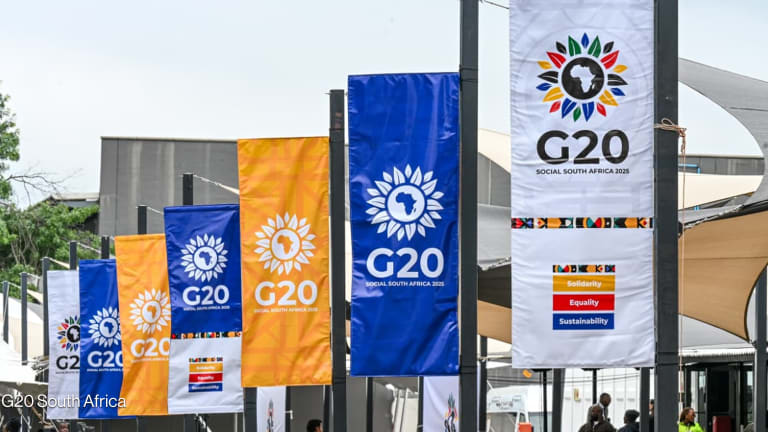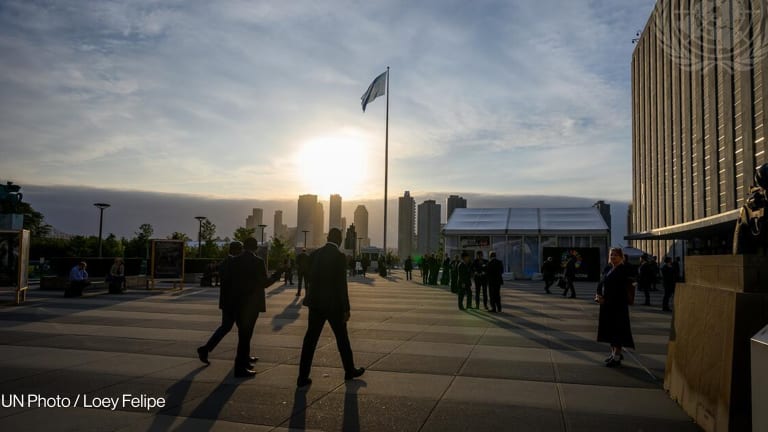
This op-ed is co-authored by Cécile Duflot, director general, Oxfam France; Aurélie Gal-Régniez, director, Equipop; Rana Hamra, president, Humanity Diaspo; Philippe Lévêque, executive director, CARE France; Céline Mas, president, ONU Femmes France; Michelle Perrot, advocacy and youth engagement director, Plan International France; and Véronique Séhier, co-president, Planning Familial on behalf of the W-7.
We are entering the final stretch before the G-7 summit, which will open on August 24 in Biarritz, France. In September 2018 before the United Nations, the president of France, Emmanuel Macron, announced a 2019 G-7 with a renewed format, focused on the Sahel region and in the fight against inequalities, and he called for women’s rights to become a “great global cause.”
Only days away from the summit, what has been done so far is not enough. As the host of this G-7, France not only needs to set an example on women’s rights at a national level, but it must also bring the other G-7 leaders to collectively commit to achieving gender equality. It is time that the “feminist diplomacy” promoted by France proves itself, including within this G-7.
Everywhere in the world, women and girls are standing up against gender-based discrimination and inequalities, from #MeToo to the defense of the right to abortion in Argentina and in the United States, from the fight against domestic violence in France, to equal inheritance in Tunisia: it is time for governments to respond to these calls.
The G-7 countries cannot stand against history. The G-7 countries have the means — through their foreign policy, their official development assistance, and their domestic policies — to boost real change for gender equality. France has rightly placed these issues high on its G-7 agenda and shows its ambition to bring forward a new feminist diplomacy, like Canada in 2018. Now France has to ensure that concrete political and financial commitments are taken by the G-7 leaders.
Women 7, which brings together around a hundred organizations and associations that are committed to gender equality all over the world, expects this G-7 to tackle the root causes of inequalities and to adopt truly feminist and transformative policies. Yet, only days away from the summit, the expected commitments look more like soft adjustments, rather than signs of a truly feminist G-7.
The French presidency made the choice to avoid the “sensitive” issues and by doing so dismissed some key ones that are central to fight gender inequalities, such as sexual and reproductive health and rights, walking past issues that are crucial for women all over the world. And even if the announcements made at the ministerial meetings have referred to gender inequalities, marking a sign of progress, they have not been backed up by financial commitments that live up to expectations.
Concerning civil society participation, it is possible to consider it the weakeast in the history of the G-7. In fact, access for associations to the media center, typically granted in all G-7 summits, is far from being achieved. As of today, no feminist association will be sitting at the negotiation table with the G-7 leaders. G-7 countries, currently represented by six men and only one woman, will be making decisions on issues such as women’s economic empowerment, girls’ education, and health, without including the ones that are first affected.
Great challenges, either diplomatic, ecological or economic, cannot be tackled without women’s and girls’ empowerment, and without their effective participation in decision-making processes. It is necessary to go farther. Only a comprehensive feminist approach can effectively allow us to fight against unequal gender power relations, for which the whole of society pays the price.
Today, the W7 published a Shadow Gender Declaration, which offers a list of the minimum commitments and the respective criteria which must be included in the final G-7 gender declaration. There is still time for game-changing actions, if the right commitments are taken and if financial means are provided.
The first priority concerns governance. It is fundamental to effectively ensure women’s and girls’ participation, including feminist activists’ participation, in the elaboration of public policies and in decision-making processes. Without taking into account feminist recommendations and analyses, domestic and foreign public policies will keep overlooking gender inequalities and will keep failing.
The second priority is financial. Current events in France are a reminder: the fight for gender equality — the “great national cause” — is still underfunded, and feminist associations are too often left to themselves. It is essential to scale up public funding, with a significant increase of budgets for gender equality policies and for feminist associations, at the national level, as well as in foreign policies.
The W7 feminist associations count on G-7 leaders to take strong measures and not to settle for weak so-called feminist policies, especially on the eve of a 2020 G-7 under the U.S. administration and a G-20 led by Saudi Arabia. In Biarritz, we will keep count of the commitments taken for women’s and girls’ rights. We will count the concrete actions and especially, we count on making our voices heard.
By announcing his intention to “make women’s rights a great global cause,” Emmanuel Macron placed France as a leader on this issue and, therefore, he has a historic responsibility to uphold: Biarritz must not be a new missed opportunity, but a moment of strong feminist mobilization for the G-7 countries.








